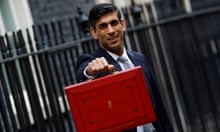The chancellor, Rishi Sunak, is coming under pressure to announce a fresh package of emergency economic support for businesses and workers hit by the last-minute launch of tougher Covid restrictions only days before Christmas.
It comes as shop owners warn of a fresh crisis on the UK high street after tier 4 restrictions in London and the south-east of England forced retailers to close during their most crucial trading period of the year.
Business leaders said the new measures, combined with new restrictions in Scotland, Wales and Northern Ireland, would deal a hammer blow to companies struggling after a difficult year, risking more business failures and soaring unemployment.
The shadow chancellor, Anneliese Dodds, said: “This last-minute announcement will have plunged many businesses into chaos. Yet in these difficult times the chancellor is nowhere to be seen.”
Calling for immediate action to safeguard Britain’s virus-stricken economy, she said Sunak could use £2bn repaid to the Treasury by supermarkets and other big shops to help struggling companies. Labour is also calling for changes to the furlough scheme to allow workers who started new jobs after 31 October to qualify for wage subsidies.
“Rishi Sunak was happy to put his name all over government policy when it suited him but now he’s totally absent. He must come out of hiding and give workers and businesses the certainty and support they deserve,” Dodds said.
Last week the chancellor unexpectedly announced an extension of the furlough wage subsidy scheme until the end of April, a month longer than planned. He also extended the availability of Treasury-backed business loans until the end of March and announced a budget for 3 March to set out the “next phase of the plan to tackle the virus and protect jobs”.
Roger Barker, the director of policy at the Institute of Directors, said “With the vaccine on its way, it would be a real shame to see jobs lost and viable companies collapse now. The chancellor should consider bolstering grants for businesses impacted by the restrictions, and fixing the gaps in the wider support.”
But even if new economic support were to be rolled out this month, the CBI lobby group said the government would need to regroup and come up with a new strategy in January that would see businesses through to the spring.
Helen Dickinson, the chief executive of the British Retail Consortium, said the high street now risked losing £2bn a week in sales for the third time this year because of tougher restrictions. She said thousands of jobs would be at risk, urging the chancellor to extend government relief on business rates – the levy paid by companies on the premises they occupy.
“The consequences of this decision will be severe. For businesses, the government’s stop-start approach is deeply unhelpful – this decision comes only two weeks after the end of the last national lockdown and right in the middle of peak trading, which so many are depending on to power their recovery.”
Large retailers, such as John Lewis, said customers would be able to pick up goods ordered online at stores, helping to keep business flowing. But many small shops are unable to offer this facility.
The London Chamber of Commerce and Industry called on the government to announce “exceptional and immediate cash grant aid” for all retail, leisure and hospitality businesses forced to close their doors under the tier 4 restrictions.
Richard Burge, the chief executive of the LCCI, added that the chancellor “must also issue appropriate instructions to banks and landlords, and must suspend the payment of all forms of taxes and rates to national and local government bodies”.
Andrew Goodacre, the chief executive of the British Independent Retailers Association, which represents thousands of independent shops, said the closures in the south and south-east were “a disaster for those businesses”, which had only been open for 17 days in the busiest month for trading.
“They need financial support that reflects what they have lost and certainly better than the grants made available in November (many of which have not been paid).”
A spokesman for the Treasury said: “We understand the pressure businesses and individuals in affected areas are currently under, which is why we’re helping them through the pandemic with a £280bn support package, which is among the most generous in the world, including extending furlough until April, helping to protect jobs.
“This includes grants for businesses forced to close of up to £3,000 a month, and grants of up to £2,100 per month to businesses which aren’t closed but are severely affected by restrictions.”









